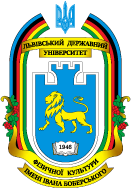PROSPECTS OF USING MOBILE TECHNOLOGIES IN LEARNING ATHLETICS FOR SPECIALISTS IN A7 “PHYSICAL CULTURE AND SPORTS
DOI:
https://doi.org/10.32782/2221-1217-2025-1-23Keywords:
athletics, mobile learning, digital technologies, sports education, interactive learning, pedagogical technologies, distance learning, education of coachesAbstract
The modern development of digital technologies actualizes their introduction into the education system of specialists in A7 “Physical Culture and Sports”. This necessitates the search for scientifically based approaches and methods for implementing mobile learning in the training of future specialists in the field of physical education and sports. Purpose of the study – determine the factors of implementing mobile technologies in the training of future specialists in the specialty A7 “Physical Culture and Sports” in the kinds of track and field athletics. Research methods. Theoretical analysis of scientific literature, comparison, generalization and pedagogical modeling. Based on the analysis of literary sources, the main factors influencing the effectiveness of implementing mobile technologies in teaching track and field athletics were identified. A pedagogical algorithm for implementing mobile technologies was developed, which involves the phased use of educational applications, interactive training plans and feedback between the teacher and the student. The use of mobile technologies allows to improve the quality of training of specialists in A7 “Physical Culture and Sports” due to the availability of educational materials and the possibility of individualizing the educational process. The key is the integrated use of electronic educational resources, mobile applications, and electronic communication tools. However, it is necessary to take into account the technical and organizational difficulties that may arise during their implementation. The use of mobile technologies in teaching athletics is a promising direction in the training of future coaches of cyclic sports. Thanks to this, conditions are created for improving the motivation and involvement of students, especially in the process of individual work. The effectiveness of mobile training of future coaches is associated with the use of active learning tools, the possibility of their application is expanded thanks to mobile technologies. Further research can be aimed at experimentally testing the effectiveness of the proposed algorithm.
References
1. Алєксєєв О.О., Петрова Ю.М., Буренко М.С. Впровадження інноваційних технологій у навчання та тренування спортсменів. Педагогічна Академія: наукові записки. 2024. № 11. С. 1–17. https://doi.org/10.5281/zenodo.13944958
2. Дядечко І., Бессарабова О., Дудко Н. Перспективи застосування сучасних інноваційних технологій у фізичному вихованні та спорті. Перспективи та інновації науки. 2024. № 11(45). С. 316–324. https://doi.org/10.52058/2786-4952-2024-11(45)-316-324 DOI: https://doi.org/10.52058/2786-4952-2024-11(45)-316-324
3. Кетова Н.В., Новікова І.В. Інноваційні підходи організації фізичного виховання здобувачів вищої освіти в умовах карантину. Науковий часопис Національного педагогічного університету імені М. П. Драгоманова. Серія 15 : Науково-педагогічні проблеми фізичної культури (фізична культура і спорт). 2021. № 12(144). С 63–65. https://doi.org/10.31392/NPU-nc.series15.2021.12(144).14 DOI: https://doi.org/10.31392/NPU-nc.series15.2021.12(144).14
4. Casey A., Goodyear V. A., Armour K. M. Rethinking the relationship between pedagogy, technology and learning in health and physical education. Sport, Education and Society. 2017. № 22(2). Р. 288–304. https://doi.org/10.1080/13573322.2016.1226792 DOI: https://doi.org/10.1080/13573322.2016.1226792
5. Lin Y. N., Hsia L. H., Hwang G. J. Fostering motor skills in physical education: A mobile technology-supported ICRA flipped learning model. Computers & Education. 2022. № 177. Р 104380. https://doi.org/10.1016/j.compedu.2021.104380 DOI: https://doi.org/10.1016/j.compedu.2021.104380
6. Lizandra J., Valverde-Esteve T., García-Massó X. Use of mobile devices as a facilitator of the practice of physical activity in physical education lessons: experience in higher education. Journal of Physical Education and Sport. 2020. № 20(6). Р 3629-3634. https://doi.org/10.7752/jpes.2020.06489 DOI: https://doi.org/10.7752/jpes.2020.06489
7. Maněnová M., Knajfl P., Wolf J. Motivation and Performance of Students in School Physical Education in Which Mobile Applications Are Used. Sustainability. 2022. № 14(15). Р. 9016. https://doi.org/10.3390/su14159016 DOI: https://doi.org/10.3390/su14159016
8. Peng M. Evaluating the Effectiveness of Mobile Interactive Technology in University Physical Education Courses. International Journal of Interactive Mobile Technologies. 2024. № 18(20). Р. 85. https://doi.org/10.3991/ijim.v18i20.51883 DOI: https://doi.org/10.3991/ijim.v18i20.51883
9. Vega-Ramírez L., Notario R. O., Ávalos-Ramos M. A. The relevance of mobile applications in the learning of physical education. Education Sciences. 2020. № 10(11). Р 329. https://doi.org/10.3390/educsci10110329 DOI: https://doi.org/10.3390/educsci10110329
10. Yu H., Kulinna P. H., Lorenz K. A. An integration of mobile applications into physical education programs. Strategies. 2018. № 31(3). Р. 13–19. https://doi.org/10.1080/08924562.2018.1442275 DOI: https://doi.org/10.1080/08924562.2018.1442275






